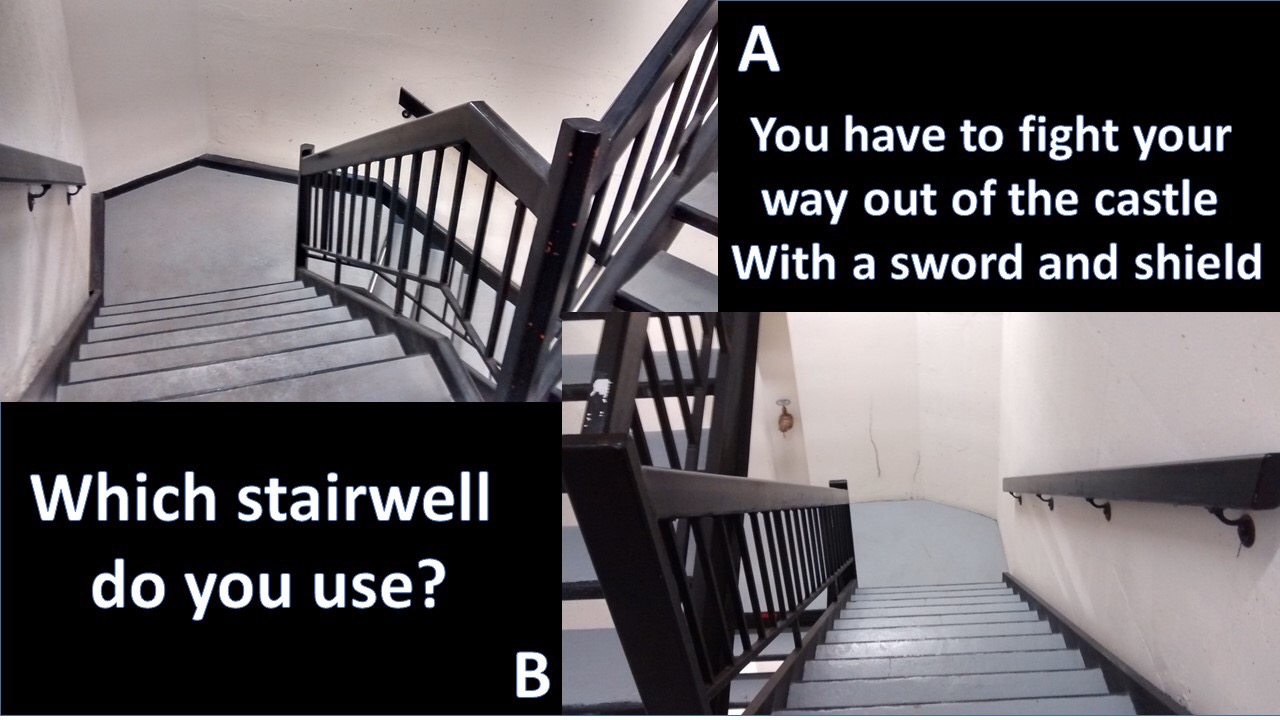Whatever I Don’t Understand Must Be Simple
“Whatever I don’t understand must be simple.”
– Dilbert’s Pointy Haired Boss

You are stuck in a castle. You have a sword and shield and you need to fight your way past the guards, also armed with swords and shields. You have a choice of which route to make your escape. The two choices are in the picture above. Which stairwell will you use?
- A – because it’s in a roughly triangular shape
- B – because it’s not in a roughly triangular shape
- C – it doesn’t matter. Both are equally good/bad
- D – depends on whether you are fighting UP the stairs or DOWN
There’s an actual answer to this question: A correct answer. If you are a skilled test taker, you might be tempted to pick D because it’s the longest answer. Or, if you don’t know the answer, you might be tempted to pick C, because C is most often the right answer.
I used to tell my employees that everything I learned about management I learned from Dilbert’s pointy haired boss. (Did you know the boss has no name? He’s simply the PHB.) One of my favorite quotes is the above. It’s easy to think that if I don’t understand a concept, it must be simple.
You might think this is counter-intuitive. After all, if I don’t understand a concept, doesn’t that mean it’s potentially hard to understand? Not really. We all assume we are smarter than average. (Half of us are correct.) I spend much of my time on outage phone conferences or bridges. During an outage bridge there are often long periods where no one is talking. Typically these are the times when people are researching or testing or gathering additional information. I’m rarely in the same room with my agents. I have to ask for not only the things I need, but also for status updates.
How tough would it be for you to find out the answer to a question if you got to ask a person in the same room with you? I’m guessing it would be pretty quick. You turn to the person next to you and ask,
“If you had to fight your way out of a castle using a sword and shield which stairwell would you take?”
If I was on the phone and waiting on that answer it might be easy for me to assume the answer should take a certain amount of time. A short period of time. But, there are lots of things I don’t know. Perhaps the person you ask is doing research. Perhaps they don’t have a chance to look at the picture right now.
When we are waiting on others, or asking others, it’s easy to assume they should be getting their answers quicker. And yet, when it’s turned around the other way, we don’t understand why the person asking us questions keeps pestering us. Don’t they understand that it takes a while to get their answers?
“Don’t rush a miracle man, sonny. You rush a miracle man, you get rotten miracles.”
– Miracle Max from Princess Bride
Looking at the picture above, it might be easy to assume that since I don’t know the answer, it must be simple. It doesn’t really matter what stairwell I choose, does it? I don’t know why it would make a difference so it must not be important.
Actually, the answer is D. (Yeah, I tried to not make it the longest, but oh well.) If you are fighting DOWN the stairs then you want to choose Stairwell A. If you are fighting UP the stairs (for example, you were stuck in the dungeon) you should pick Stairwell B.
That’s stupid Rodney. What possible difference could it make?
Imagine you are armed with your sword and shield. Hold you sword up above your head. Ninety percent of you have your right hand above your head. That means your shield is in your left hand. Look at Stairwell A. As you walk down the stairs, your shield is next to the wall. You have the open space to your right to swing your sword. Your opponent, on the other hand is reversed. His sword arm is next to the wall. While you pin your shield to the wall to protect your left side, he has to expose both his left and right sides.
Now, look at Stairwell B. As you move UP the stairs, again, you get to put your sheild against the concrete wall and swing your sword in the open space to the right. Your opponent is again at a disadvantage as he has to try to swing without hitting the wall.
Does this make a difference? It did to people who built castles. They built their interior stairs so that the defenders always had the wall to their left. The attackers were always at a disadvantage.
Just because I don’t understand something doesn’t mean there isn’t a really good reason for it.
(BTW, theves are the stairwells in my building. I always go UP Stairwell B and come DOWN Stairwell A. . .just in case I’m ever attacked in the stairwell. . .with a sword.)
Rodney M Bliss is an author, columnist and IT Consultant. His blog updates every weekday. He lives in Pleasant Grove, UT with his lovely wife, thirteen children and grandchildren.
Follow him on
Twitter (@rodneymbliss)
Facebook (www.facebook.com/rbliss)
LinkedIn (www.LinkedIn.com/in/rbliss)
or email him at rbliss at msn dot com(c) 2016 Rodney M Bliss, all rights reserved
